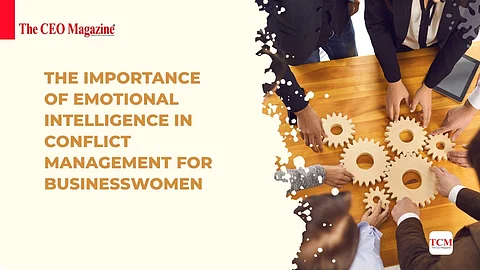
- News
- Women
- Magazine
- IndustryIndustry
- InsightsInsights
- Success Stories
- PublishPublish
- ContactContact
- Media KitMedia Kit

The Importance of Emotional Intelligence in Conflict Management for Businesswomen
In today’s fast-paced and competitive business environment, effective conflict management is crucial for maintaining a harmonious workplace. For businesswomen, mastering the art of conflict resolution is not just about negotiation tactics; it significantly hinges on emotional intelligence (EI). Understanding and harnessing EI can empower women to navigate conflicts with confidence, empathy, and strategic insight. This article delves into the importance of emotional intelligence in conflict management, specifically tailored for businesswomen.
Emotional intelligence refers to the ability to recognize, understand, and manage our own emotions while also being attuned to the emotions of others. Daniel Goleman, a pioneer in the field, identifies five key components of emotional intelligence:
Self-awareness: Recognizing one’s emotions and their impact on thoughts and behaviors.
Self-regulation: The ability to control or redirect disruptive emotions and impulses.
Motivation: A passion for work that goes beyond money and status, driven by a desire to achieve.
Empathy: Understanding the emotional makeup of other people and treating them according to their emotional reactions.
Social skills: Proficiency in managing relationships and building networks.
Incorporating these elements into conflict management can drastically improve outcomes for businesswomen, fostering stronger relationships and enhancing collaboration.
Self-awareness allows businesswomen to recognize their triggers and emotional responses during conflicts. By understanding their feelings, they can approach disputes with a clearer mind, reducing the likelihood of reactive behavior. This self-awareness serves as a foundation for effective conflict resolution, enabling them to stay calm and focused, even in heated situations.
Empathy is particularly vital in conflict management. By genuinely understanding and appreciating the perspectives and feelings of others, businesswomen can navigate disagreements more effectively. Empathetic leaders foster a culture of respect and open communication, allowing team members to express their concerns and feel heard. This not only resolves conflicts more amicably but also strengthens team cohesion.
Emotional intelligence enhances communication skills, enabling businesswomen to express their thoughts and feelings clearly and constructively. By articulating their viewpoints without aggression, they create an environment conducive to collaboration. Effective communicators are better equipped to de-escalate conflicts and facilitate discussions that lead to mutually beneficial solutions.
Conflicts often evoke stress and negative emotions. Businesswomen equipped with high emotional intelligence can manage their stress levels and maintain emotional balance. This ability allows them to approach conflicts rationally rather than emotionally, leading to more productive conversations and outcomes.
Businesswomen with strong emotional intelligence tend to build and maintain positive relationships within their teams. These relationships are essential during conflicts, as trust and rapport facilitate open dialogue. When team members feel secure in their relationships, they are more likely to approach conflicts collaboratively rather than adversarially.
Women leaders who demonstrate emotional intelligence set a powerful example for their teams. By showcasing self-awareness, empathy, and effective communication, they inspire others to adopt similar behaviors. This leadership style cultivates a workplace culture that values emotional intelligence, leading to improved conflict management across the organization.
Developing emotional intelligence is a continuous process. Here are several strategies businesswomen can employ to enhance their emotional intelligence for effective conflict management:
Practice mindfulness: Engage in mindfulness exercises to increase self-awareness and emotional regulation.
Seek feedback: Actively seek constructive feedback from peers and mentors to understand how your emotions affect others.
Reflect on experiences: After conflicts, reflect on your responses and outcomes to identify areas for improvement.
Invest in training: Attend workshops or courses focused on emotional intelligence and conflict resolution.
Emotional intelligence is a vital asset for businesswomen navigating conflicts in the workplace. By cultivating self-awareness, empathy, and effective communication skills, they can resolve disputes more amicably and foster positive relationships within their teams. As women continue to break barriers in the business world, honing emotional intelligence will not only enhance their conflict management abilities but also contribute to their overall leadership effectiveness.
Follow us on Google News
